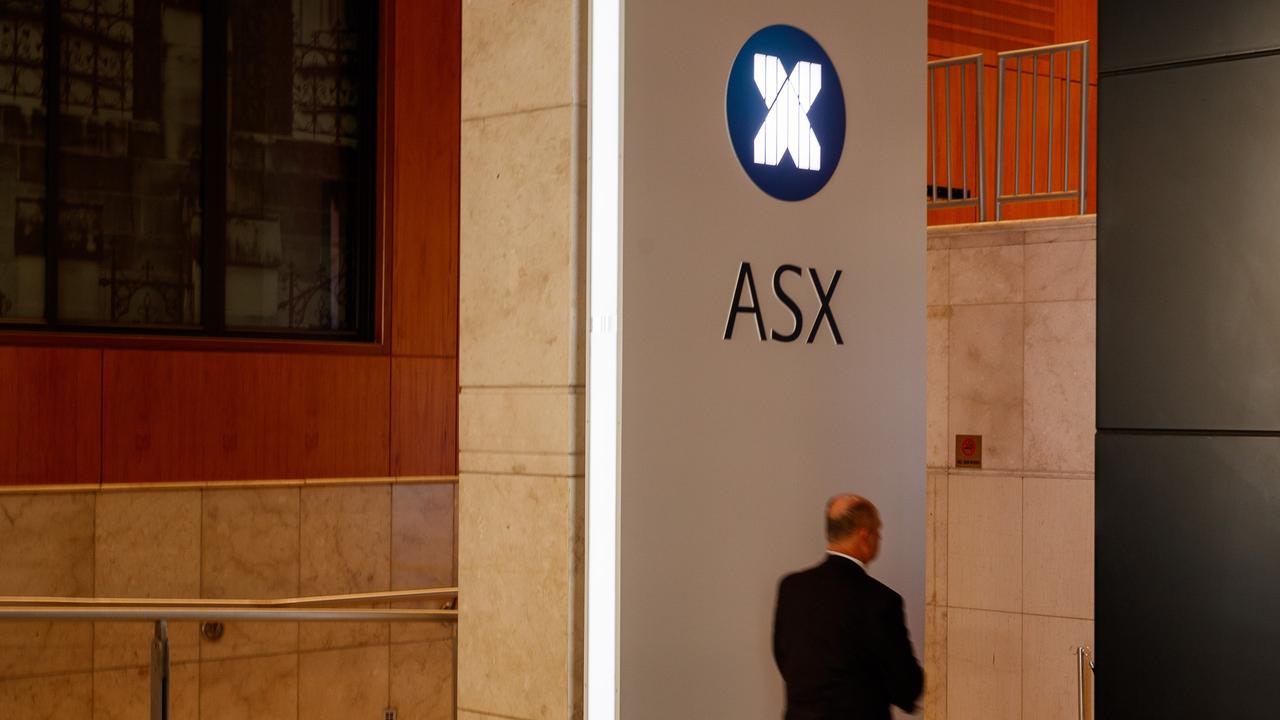ASX reverses early lift, JB Hi-Fi cautious on guidance
Australia’s share market ended a 4-week losing streak even after a slight fall on Friday.

- Cleanaway’s Bansal apologies to staff
- No guidance from JB Hi-Fi
- Macquarie in bid for Open Fiber stake
- Weiss wins spot on Cromwell board
That’s all from the Trading Day blog for Friday, September 18. Australia’s share market ended a 4-week losing streak even after a slight fall on Friday.
After initially rising 0.3pc, the S&P/ASX 200 lost 0.7pc intraday before closing down 18.7 points or 0.3pc at 5864.5.
The index was hit by some late selling as it fell 12 points in the closing match.
On Wall Street overnight the Dow Jones Industrial Average lost 0.5 per cent, the S&P 500 dropped 0.8 per cent and the Nasdaq fell 1.3 per cent.
4.29pm: ASX ends 4-week losing streak
Australia’s share market ended a 4-week losing streak even after a slight fall on Friday.
After initially rising 0.3pc, the S&P/ASX 200 lost 0.7pc intraday before closing down 18.7 points or 0.3pc at 5864.5.
The index was hit by some late selling as it fell 12 points in the closing match.
It just managed to end a four-week losing streak with a 0.1pc rise.
After Wall Street bounced off its recent lows overnight, the local market spent the day tracking US futures up and down.
Industrials, Utilities, Health Care, Real Estate, Financials, Consumer Staples, Communications and Consumer Discretionary sectors underperformed.
Within those sectors, Transurban lost 3.1pc, APA Group fell 0.9pc, CSL fell 1.1pc, Scentre fell 2.2pc, CBA fell 1pc, Woolworths fell 1.2pc and Wesfarmers lost 2.8pc.
Tech and Materials outperformed with Afterpay up 2.7pc and South 32 up 3.7pc.
Volume was boosted by settlements related to Thursday’s expiry of September options contracts.
The Australian dollar was steady against the US dollar by the close of the ASX session, trading around US73.15c.
Damon Kitney 4.06pm: Logistics bosses lament lack of plan
Two of the nation’s logistics industry leaders believe the lack of a national plan to bring the nation out of the COVID crisis could jeopardise the recovery from the pandemic, especially as companies look to accelerate investments across their supply chains.
Coca-Cola Amatil’s general manager logistics, Phillip Parsons, told a Trans-Tasman Business Circle forum on Friday that the logistics industry continued to be hit hard by border closures and the Victorian lockdown.
He pointed to a number of examples of his current frustrations, including Coke’s inability to get people into its Melbourne facilities, disruption on the waterfront in Sydney and a truck driver from Melbourne to Brisbane getting stopped eight times at border crossings during his journey.
“We are unaligned,’’ he told the forum, contrasting the current situation with the strong previous work of the National Cabinet to help the country confront the COVID crisis.
“I don’t feel the same coming out of recovery. I think it is really unhelpful. We need to have more alignment.”
He said the fragmented approach taken by the states in their COVID recovery plans was unnecessarily hampering the logistics sector and business more broadly.
3.36pm: ASX may break 4-wk losing streak
Australia’s S&P/ASX 200 share index will break a 4-week losing streak today if it ends above 5859.42.
It comes as the S&P 500 and Nasdaq look set to end two-week losing streaks after bouncing off chart support levels last night.
That follows falls of 4.8 per cent and 7.4pc respectively in those key US benchmarks in the past two weeks.
But on the flipside, the US market was capped on the bounce to last week’s highs this week, leaving pressure on support levels.
There’s a hiatus of new US macroeconomic stimulus before the US election reflected in a cooling of Citi’s US economic surprise index from a record high in July.
Plus, JPMorgan has calculated a $US200bn ($275bn) month end selling requirement by funds that tend to rebalance on a quarterly basis – in particular the US defined benefit pension plans, the Norwegian oil fund, and the Japanese government pension plan.
That comes at a time when liquidity in S&P500 futures has shrunk by 70pc since the end of August, according to JPM.
“In our opinion, this negative rebalancing flow becomes even more problematic given this month’s sharp decline in equity market depth,” said JPM’s Nikolaos Panigirtzoglou this week.
As for the Australian market, after losing 4.4pc in the past 4 weeks, it’s debatable whether a small rise this week will really mean the coast pullback is over.
The index is currently up 0.4pc at 5883.5 for the week, after falling as much as 5.9 per cent from a 5-month high of 6199.2 on August 25th to a 2.5-month low of 5836.2 last Friday in its longest string of weekly losses since March.
However, the S&P/ASX 200 Banks index, which makes up 18pc of the S&P/ASX 200, is set to lose more than 1pc for the week, marking its third-straight weekly decline.
Meanwhile , the S&P/ASX 200 Materials index, which makes up 23pc of the S&P/ASX 200, is set to rise for a second straight week.
S&P/ASX 200 last flat at 5883.
James Gerrard 3.07pm: Time to change on negative gearing?
You would think property investors would be thrilled with record low interest rates; however, many are experiencing a problem never seen before. Rather than receive an annual tax windfall on their negatively geared properties, as they are used to, some property investors are having to pay top-up tax as their investments become positively geared.
So is it time for property investors to embrace paying tax or to review the strategy and look for ways to reinstate those precious negative gearing benefits?
A property is negatively geared when the expenses are greater than the income, creating a loss that is able to be used as a tax deduction, to reduce tax paid on other forms of income such as wages and other investment income.
Expenses include cash expenses such as interest on the loan and non-cash expenses such as depreciation. But why would a property investor want to lose money on an investment? Sounds counterintuitive to have a strategy where you try to lose money, only to get part of it back through tax.
However, negative gearing has remained a popular strategy through the years and one of the main reasons the Labor Party lost the federal election last year when it proposed restricting negative gearing to new property owners only.
The key to negative gearing is accounting for growth and the deferral of tax. Although a property’s rent may not cover the expenses and there is, say, a $10,000 out-of-pocket cost, if the property is growing in value by $100,000 a year then it may make sense to pay a little to get a lot.
2.39pm: Discretionary retail cut to Neutral: UBS
UBS quantitative analyst and equity strategist Pieter Stoltz neutralized his previously positive position on the discretionary retail sector in his “20/20” model share portfolio since relatively strong employment data this week may mean there’s’ less macroeconomic stimulus from here.
“Although a lower than expected unemployment rate is a longer term positive, the potential for less stimulus is a short term negative that could weigh on Retail more than other sectors,” he said.
Within the sector, he prefers Harvey Norman over JB Hi-Fi, given Harvey Norman is trading at a 30 per cent PE discount to JB Hi-Fi versus a long term average of 4 per cent.
But while he sees downside risk for equities after Q3 due to a potential $70bn fiscal cliff, Mr Stoltz feels the economic signposts show no clear turning point in the positive momentum.
Thus he remains overweight on cyclical sectors including Gaming. Within Gaming, he likes Tabcorp and Aristocrat.
Mr Stoltz also neutralized a negative weight on Sky City negative weight, given positive near-term earnings momentum.
In Metals and Mining, he prefers Independence Group over Western Areas, given upcoming positive catalysts for Independence Group.
He still prefers BHP over Rio Tinto, given operational and commodity price headwinds for RIO.
In Steel, he still likes Sims Metal over BlueScope, given China ferrous imports and cloud recycling are positive for Sims.
Mr Stoltz also removed sector preferences in Gold, given positive newsflow for Evolution, and also in Building Materials, since UBS upgraded Adbri to Neutral.
In Telcos, he removed a negative weight in TPG since the share price fell, but maintains a positive weight in Telstra based on its attractive free cash flow yield.
A negative weight in Brambles is driven by its low free cash flow yield.
In Utilities, despite some headwinds in 2020-21, he still prefers APA for its growth opportunities over AGL and Spark.
In Consumer Staples he likes Woolworths and Metcash over Coles, given better supplier survey results for Woolworths and strong trading conditions for Metcash.
2.14pm: Key speech ahead from RBA’s Debelle
Stronger-than-expected jobs data this week, albeit boosted by self-employed people on potentially quite low incomes, has heightened the focus on a speech by RBA Deputy Governor Guy Debelle at 10.30am Tuesday on “The Australian Economy and Monetary Policy”.
“Dr Debelle will likely cite the research published in the RBA’s September bulletin on the economic effects of unconventional monetary policy,” ANZ economists say.
“This research concluded that pushing bond yields lower through unconventional monetary policy can have as much of an impact on the economy as conventional rate cuts.
“This keeps the prospect of further RBA policy steps on the table, but we don’t expect Debelle to signal any such moves are imminent. We think the RBA is on hold until 2021.”
Dr Debelle will be addressing the Australian Industry Group conference.
Robyn Ironside 2.07pm: Qantas’s Joyce takes big pay cut
Qantas Group CEO Alan Joyce has seen his pay fall from almost $10m last year to $1.7m in the 2020 financial year, during which he declined $1.4m worth of bonus shares.
The airline released its annual report to the ASX on Friday including details of executive remuneration which showed Mr Joyce’s salary dropped by 83 per cent following three months of no pay due to the COVID crisis.
A long term incentive bonus based on the Qantas share price would have netted the CEO 343,500 shares worth about $4 each, but Mr Joyce offered not to take them.
Other executives saw their salaries fall 69 per cent overall, after also taking no pay for three months.
Overall executive salaries totalled just under $7m, down from $22.4m the previous year.
All executives have now resumed their salaries at 85 per cent of their base pay, while Mr Joyce was being paid 65 per cent of his $2.15m base salary.
12.55pm: Oscar Wylee fined over charity claims
Oscar Wylee has been fined $3.5m after the eyewear retailer admitted to having made false representations about its charitable donations, claiming that for each pair of glasses purchased, it donated a pair to someone in need, when it didn’t.
The consumer watchdog said that between January 2014 and December 2018, the company sold 328,010 pairs of glasses but only donated 3181 frames to charity, without lenses, which is about one set of frames for every 100 pairs of glasses sold.

“Oscar Wylee promoted its charitable activities as a core reason why consumers should buy Oscar Wylee glasses, but its claims were false and were made in circumstances where consumers could not easily verify these claims for themselves,” ACCC deputy chair Delia Rickard said.
“The misleading conduct also portrayed Oscar Wylee as a socially-conscious company that made significant donations of glasses to people in need, which, because this was not true, unfairly differentiated it from other brands in the market.”
12.00pm: ASX fades to flat after fast start
Australia’s share market turned down with US futures after an early rise.
The S&P/ASX 200 was almost flat at 5878 after falling as much as 0.3pc to a 4-day low of 5866.1.
The index rose as much as 0.7pc to an intraday high of 5921.4 in early trading but reversed course as S&P 500 futures fell as much as 0.6pc, after initially rising 0.2pc.
Asian markets were mixed with the Hang Seng index up 0.2pc even as Tencent fell 2.6pc after Bloomberg said the Trump administration asked gaming companies to hand over information about their data-security protocols involving the Chinese tech giant.
AMP fell 8.4pc ex-dividend, Reliance Worldwide lost 4pc after UBS cut its rating to Neutral and Unibail-Rodamco-Westfield fell 3pc after it planned a EUR3.5bn capital raising.
Banks and property trusts fell with ANZ down 0.6pc and Scentre down 1.7pc despite news that QLD will reopen its border to the ACT overnight.
11.50am: Reliance lower after downgrade
Shares in plumbing supplies company Reliance Worldwide were trading down 3.9 per cent at $3.83 after UBS analysts downgraded their recommendation on the stock to neutral, saying that long term revenue growth of 7 per cent in the US is now priced in.
That revenue growth figure was above UBS’ forecast of 5 per cent long term.
“Reliance Worldwide had fallen out of favour in recent years on ambiguity over long term revenue growth expectations,” the analysts said.
“However, post the fiscal year 2020 result, confidence in US revenue growth has been restored and this was driven by the second half US revenue performance. The market is now pricing in 7 per cent long term. This remains above our expectation for 5 per cent long term, and subsequently we rate Reliance Worldwide to neutral.”
11.45am: Tokyo flat, HK up in cautious trade
Tokyo stocks opened flat in cautious trade ahead of a long weekend, with investors factoring in a higher yen and falls on Wall Street.
The benchmark Nikkei 225 index was up 0.03 percent or 6.68 points at 23,326.05 in early trade, while the broader Topix index was up 0.04 percent or 0.72 points at 1,639.12.
“As the Japanese market has already factored in declines in the US market, purchases are slightly more dominant than sell orders in early trade, but a wait-and-see attitude will likely grow later ahead of a four-day holiday,” Toshiyuki Kanayama, senior market analyst of Monex, said in a commentary.
Hong Kong stocks began slightly higher but investors remain cautious following another negative day on Wall Street hit by worries about the global economic recovery.
The Hang Sang Index added 0.17 percent, or 40.28 points, to 24,381.13. The benchmark Shanghai Composite Index was flat, dipping 0.61 points to 3,269.83, while the Shenzhen Composite Index on China’s second exchange was also barely moved, inching up 0.25 points to 2,187.24.
AFP
Damon Kitney 11.40am: Crown sets out incentive payments
The James Packer-backed Crown Resorts scrapped short term bonuses for its executives but apportioned them $1.84 million worth of payments under the company’s long term incentive plan, in a year when the company received over $110 million in government assistance payments.
Crown in August announced it had scrapped its final dividend and secured a waiver of its banking covenants after its net profit fell to $79.5m and revenue fell 25 per cent to $2.2bn following the forced closure of its casinos in Melbourne and Perth.
The company’s annual report released on Friday revealed the company’s executives received no short term incentive bonus entitlement for 2020.
The accompanying notice of meeting for the company’s upcoming AGM also revealed that former executive chairman John Alexander will not seek re-election and retire from the company at the meeting.
Ben Wilmot 11.37am: Weiss makes Cromwell board at third try
Corporate raider Dr Gary Weiss and Melbourne businessman Joe Gersh have won seats at the Cromwell Property Group board table in a tight vote in which they were elected with the backing of 52.33 per cent and 58.96 per cent of votes respectively.
Their victory was driven by Singapore’s ARA Asset Management and support from substantial shareholder the Tang family, with smaller shareholders and institutions mainly rejecting their push.
ARA used creep provisions under the Corporations Act to increase its stake to 27.38 per cent and combined with Tang’s holding of 17.56 per cent account for 44.94 per cent of the register.
Their combined backing contributed about 98 per cent of votes for Dr Weiss and about 87 per cent for Mr Gersh.
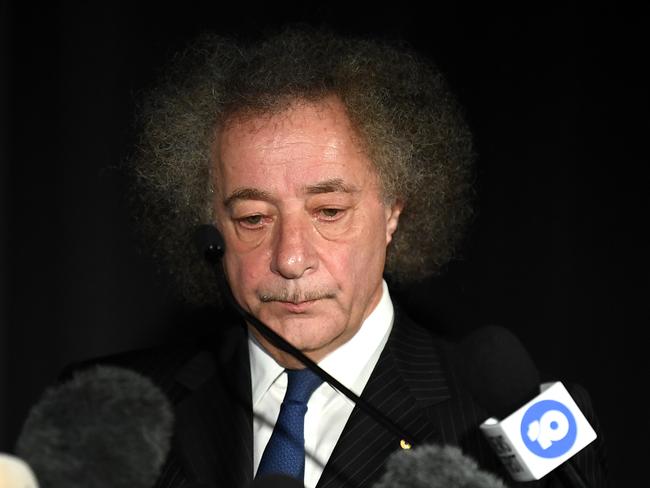
The meeting attracted a huge 88 per cent shareholder turnout with 6,280 individual holders voting against the appointment of Dr Weiss and 115 shareholders backing him. Mr Gersh’s bid had similar numbers with 6,258 individual holders voting against him and 119 shareholders voting for his appointment.
Dr Weiss had twice failed in attempts to be elected to Cromwell’s board.
11.18am: Shares fall into the red
The local market has taken a firm turn lower - erasing all of the previous 0.6pc lift as it drops by 0.2 per cent.
After the first hour, the benchmark ASX200 is lower by 14 points or 0.24 per cent to 5868.9.
All sectors bar energy, tech and materials are now in the red - led by a 1.1pc dive in Industrials and 0.8pc fall in consumer staples - largely thanks to drag from Wesfarmers, Coles and Woolies.
AMP is the biggest drag - off by 7.9pc as its trades ex-dividend, while Unibail Roadamco Westfield is taking a 3.6pc hit after its bond issue completed this week.
Local shares continue to slide with the #ASX 200 now in the red. The index is down 16pts with most sectors falling #ausbiz pic.twitter.com/EtZkmoPExj
— CommSec (@CommSec) September 18, 2020
10.43am: Share gains fade to 0.1pc
Shares are fading from their early boost, trimming early 0.6 per cent gains to just 0.13 per cent after the first half hour.
The ASX200 touched highs of 5921.4 but was quick to retreat. Last up just 8 points or 0.13 per cent to 5890.9.
It comes as US futures dip back into the red, now down 0.9 per cent.
The major banks are the biggest contributors to the fall - NAB and Commonwealth Bank both off by 0.4pc while Westpac shares fall 0.5pc and ANZ is worst hit with a 0.8pc drop.
Afterpay is providing some relief, with shares up by 2.2pc, while BHP adds 1.6pc, Rio by 1.7pc and Macquarie rising by 1.4pc.
Ben Wilmot 10.36am: Weiss in new tilt for Cromwell board spot
A bid by corporate raider Dr Gary Weiss and Melbourne businessman and ABC board member Joe Gersh to be appointed to the board of Cromwell Property Group is likely to get up in a tight vote at a meeting on Friday.
Their move is being backed by dissident shareholder ARA Asset Management, which controls about 26 per cent of the register and has also launched a partial takeover bid.
Dr Weiss was last week rejected by institutional proxy adviser ISS but it supported Mr Gersh, who is effectively on the same ticket, to be appointed to Cromwell’s board.
The move had provoked fierce resistance from the Paul Weightman-led company, which sees ARA as a competitor, and earlier this month proxy house CGI Glass Lewis lashed the push to elect them to the board on multiple grounds.
By contrast, another proxy adviser, Ownership Matters, told its clients to back Dr Weiss and Mr Gersh to be elected to the Cromwell board.
Dr Weiss had twice failed in attempts to be elected to Cromwell’s board but investment house JPMorgan, which has been critical of the company’s high gearing and said it may need to raise equity, said this month that his bid would likely narrowly succeed.
ARA and Cromwell have been at loggerheads and the tensions saw ARA’s local chief David Blight resign from Cromwell’s board in mid-2019, shortly after it was cut out of an institutional placement.
ARA has since launched a low-ball partial takeover for Cromwell and run a media campaign critical of the company’s direction. The $2.7bn company last month reported an operating profit lift of 27 per cent to $221.2m, even as the coronavirus pandemic crisis struck its investments, including a controversial $1bn Polish shopping centre portfolio.
Cromwell this month appointed a new independent non-executive director to its board, tapping lawyer John Humphrey. But all eyes will be on Dr Weiss and Mr Gersh if they take their seats in Cromwell’s boardroom as expected.
10.24am: Hertz bankruptcy bonuses ‘offensive’
A US bankruptcy judge blasted Hertz Global Holdings’ plan to pay top managers up to $US14.6 million in bonuses after they collected millions in additional bonuses days before the rental car company filed for bankruptcy.
“It seems offensive to give senior executives bonuses when they were paid” retention compensation immediately before the bankruptcy was filed, Judge Mary Walrath said Thursday in U.S. Bankruptcy Court in Wilmington, Del. The 14 most senior executives could receive as much as $US5.4 million.
“The incentive plan has serious problems,” she said, asking Hertz to revise it.
The judge also said the financial targets the Hertz executives need to hit to qualify for the bonuses need to be tougher, echoing objections by a federal bankruptcy watchdog
That proposed $US14.6 million in potential incentive compensation was on top of the $US16.2 million in retention bonuses Hertz, just days before its May bankruptcy filing, said it would pay to about 340 employees in recognition of the uncertainty faced as a result of the novel coronavirus pandemic’s impact on travel.
The new incentive plan would pay 309 employees.
The judge’s ruling is a victory for a group of retired Hertz executives who criticized the new bonus plan, saying the company’s promises to provide them with a secure retirement are being cast aside.
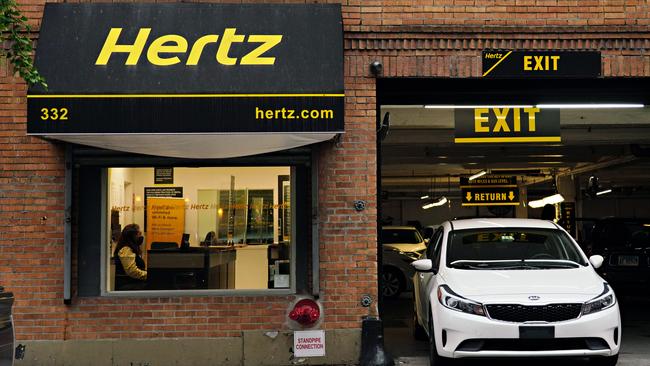
Dow Jones
10.19am: ASX opens higher than expected
Australia’s share market rose more than expected in early trading after Wall Street bounced off chart support levels overnight.
The S&P/ASX 200 rose 0.6pc to 5919.2 with the Tech, Materials, Communications and Energy sectors outperforming.
It later faded to be up 0.1 per cent.
Afterpay jumped 3.5pc while the Materials sector did the heavy lifting, with BHP up 2.2pc and Rio Tinto up 2.4pc.
Banks and property trusts disappointed, with ANZ down 0.6pc and Scentre down 1.7pc.
Share trading volume was boosted by settlements of September options contracts that expired Thursday.
Bridget Carter 10.10am: Cleanspace price IPO
Cleanspace has priced its IPO at $4.41 per share.
The company will raise $131.4m and its market value will be $339.7m.
On an enterprise value basis, the business will be worth $305m.
More to come
Ben Wilmot 10.05am: Scentre ‘buys time’ with issue
Scentre Group’s innovative issue of US$3bn ($4.1bn) of hybrids has been welcomed by analysts but some still want the local Westfield mall owner to do more as it faces earnings dilution from the impact of the coronavirus crisis.
Macquarie Equities said the move was about 5 per cent dilutive to earnings per share but was better than the company undertaking a share raising.
“The earnings dilution is about 5.3 per cent in fiscal 2021 given the hybrid proceeds can be used to pay down existing debt issuances instead of accruing interest revenue from cash at bank,” Macquarie said.
They said this was less than the impact of an equity raising and estimated a $2bn equity raising at the current share price would be about 14 per cent dilutive to earnings.
“This alleviates any near term equity raising risk in our view. We expect equity investors will continue to treat the hybrids as debt. If there are limited asset value declines from here, then Scentre would have the highest leverage to a potential retail recovery,” Macquarie Equities said. “However, this does not provide a solution to elevated levels of debt in our view.”
Jefferies analysts said the subordinated hybrid notes had attractive pricing and diversified the company’s sources of capital, improved its balance sheet and helped keep its A credit rating.
“We prefer this approach to more expensive and dilutive equity, however given the spread to bank debt being paid down, dilution is still material in fiscal 2020 and fiscal 2021 of 5.8 per cent and 11.7 per cent and the notes have no equity conversion features despite being callable by Scentre after 6 and 10 years,” Jefferies said.
Scentre’s notes receive 50 per cent equity credit from rating agencies and are not included as liabilities in its covenants, but Citi said this treatment was “quite generous” given that the instruments are much closer to debt than equity.
“The note issuance buys Scentre time and reduces the risk of a near-term equity raising but does not de-lever the group, in our view. Other analysts’ forecasts did not reflect an equity raising or asset sales, so the cost of the hybrid will likely lead to consensus earnings per share being downgraded,” Citi said.
“We do not believe that today’s announcement addresses Scentre’s primary issues. Falling mall values should continue to have a magnified impact on Scentre’s equity value. After a 10 per cent rally, the stock is now dearer than Vicinity, despite a meaningfully weaker balance sheet, and trades on about 12 times funds from operations, while many offshore peers trade on less than five times.”
9.59am: What’s impressing analysts?
Beach Energy raised to Buy: Citi
Aristocrat raised to Positive: Evans & Partners
Immutep started at Speculative Buy: Bell Potter
Mincor cut to Hold: Shaw and Partners
Mineral Resources raised to Hold: Morningstar
Nanosonics started at Neutral: GS
QBE Insurance raised to Buy: Morningstar
Discretionary Retail sector cut to Neutral: UBS
Reliance Worldwide cut to Neutral: UBS
Eli Greenblat 9.55am: Cleanaway’s Bansal apologises to staff
Embattled chief executive of Cleanaway Waste Management, Vik Bansal, has emailed staff apologising for his behaviour in the workplace and for the negative attention it has brought to the company.
He added that since the scandal had broken in the last week he had received support from colleagues and staff in a range of emails, texts and phone calls.
Mr Bansal’s tenure as CEO has come under intense pressure in the last week amid allegations of bullying in the workplace and engaging in angry and heated language with senior management. He was warned by his board to behave, with him undergoing monitoring and mentoring to correct his poor behaviour.
In an email to Cleanway staff, Mr Bansal apologised for his behaviour, the attention it has brought to the company and also defended the group’s recent safety record.
“This week there have been a series of stories in the media relating to my behaviour in the workplace,’’ Mr Bansal began the staff email.
“The board put out a statement to the ASX acknowledging that there had been an investigation into my behaviour as a CEO and elements of my management style. As a result, we introduced a range of measures including executive leadership mentoring, enhanced reporting relating to my engagement with employees, and monitoring of my conduct.
“I would like to sincerely apologise to all of you about what has occurred and related attention it is bringing to Cleanaway.”
9.44am: Upside risk for ASX?
Australia’s share market may have short-term upside risk after the US sharemarket held chart support levels and US index futures rose slightly in afterhours trading.
Overnight futures relative to fair value suggest the S&P/ASX 200 will open up 0.2pc at 5895, but it may test its 50-day moving average at 6030 before buying fades.
The S&P 500 fell 0.8pc to 3357 but that was a bit less than expected. Moreover it pared more than half of a 1.7pc intraday fall, bouncing off its 50-day moving average and the recent lows.
Similarly, while the Nasdaq fell 1.3pc to 10910, it recovered more than half of a 2.4pc intraday fall and bounced off last Friday’s low.
A retest of last week’s highs on Wall Street (+2pc for S&P 500 and +3.5% for Nasdaq) now looks possible.
Any further improvement in Victoria’s coronavirus numbers could also boost Australian economic reopening trades including banks.
A 2pc rise in WTI crude prices should help the Energy sector. BHP ADR’s suggest BHP will open up 1.7pc at $37.76 though spot iron ore fell 1.8pc to $US122.05 a tonne.
But triple bottoms like those that have now formed in the US market are typically weak. It may be forming “bear flag” patterns with sharp falls similar to the early September drops still on the cards.
While a lack of new stimulus from the Fed has not caused immediate concern, the market now faces the prospect of a large negative quarter-end rebalance, economic risk from the lack of new monetary or fiscal stimulus while the coronavirus pandemic continues, and political uncertainty before the US election.
Eli Greenblat 9.26am: No guidance from JB Hi-Fi
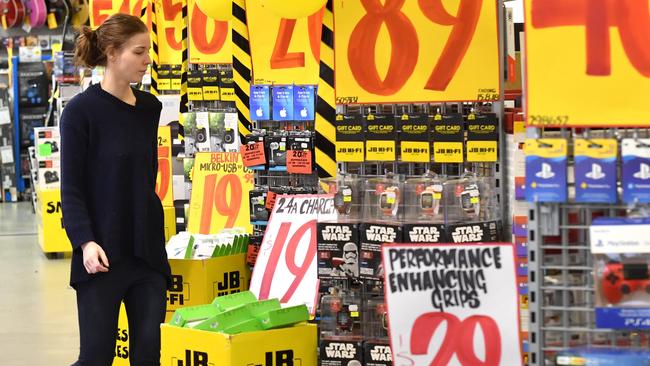
JB Hi-Fi will not be providing sales guidance for 2021 as the COVID-19 pandemic continued to cloud the outlook for the retail sector and the economy.
In its annual report released to shareholders on Friday, JB Hi-Fi chairman Stephen Goddard and chief executive Richard Murray said the retailer continued to perform well despite the health and economic crisis.
“While the group is pleased with its start to fiscal 2021 and current trading, in view of the uncertainty arising from COVID-19, the group does not currently consider it appropriate to provide fiscal 2021 sales guidance,” the annual report said.
“The key success drivers of the group continue to be having the biggest range and the lowest prices, supported by a talented and enthusiastic team of almost 13,000 team members across Australia and New Zealand.
“Our team members are our number one asset and our most important competitive advantage, their dedication and knowledge continues to delight our customers everyday. We look forward to another successful year in fiscal 2021.”
It said its operations were affected significantly by the COVID-19 pandemic and resulting government actions.
“Fiscal 2020 has been a strong year in the most challenging of times for JB Hi-Fi Limited and its subsidiaries. We were pleased to report strong sales and earnings for the year ended 30 June 2020 and importantly, we provided customers with the products they required as they spent time working and learning at home as well as upgrading their home appliances and entertainment products, and kept our team members in jobs with an absolute focus on health and safety.”
According to the annual report Mr Murray had a base salary of $1.35 million in 2020 with a range of benefits, options and other payments taking his remuneration for 2020 to $3.895m. In 2019 his total remuneration was $3.93m.
9.06am: Fed may extend bank capital curbs
The Fed will decide in two weeks whether to extend capital curbs on large US banks, including caps on dividend payouts and bans on share buybacks, into the December quarter.
These measures to preserve bank capital were announced in June and were due to expire at the end of the September quarter.
JPMorgan for one has stated that it may resume buybacks in the December quarter if allowed by regulators.
US bank shares haven’t reacted in after hours trading, but this is a potential uncertainty for investors.
The Fed announced its consideration of extended curbs on capital and hypothetical scenarios for a second round of bank stress tests after the US market closed.
Eli Greenblat 8.56am: Todorcevski to leave Coles board
Coles has announced the retirement of Zlatko Todorcevski as a non-executive director of the company, with effect from the end of the month. This follows Mr Todorcevski’s appointment as chief executive of Boral Limited, as announced by Boral in mid June.
Mr Todorcevski has been a non-executive director of Coles and chairman of the audit and risk committee since November 2018, having joined the Coles board on its demerger from Wesfarmers.
Coles also announced the appointment of Paul O’Malley as an independent non-executive director, with effect from October 1.
Mr O’Malley has served as the CEO of BlueScope Steel for 10 years, following two years as its chief financial officer. Mr O’Malley was also previously the chairman and CEO of TXU Energy, a subsidiary of TXU Corp based in Dallas, and held various other senior financial management roles within the TXU Group. Prior to joining TXU Group, Mr O’Malley worked in investment banking and consulting. He is currently a non-executive director of the Commonwealth Bank of Australia.
Jared Lynch 8.54am: Fonterra back in the black
Fonterra, the world’s biggest dairy exporter, has returned to paying shareholders a dividend after the New Zealand co-operative swung back into profit, following a $NZ1.3bn ($1.2bn) turnaround.
The group’s net profit surged from a $NZ610m loss in 2019, to a $NZ659m profit in the year to July 31, following a change to its structure and a new strategy that focused on dairy products and food service. Overall revenue meanwhile firmed 5 per cent to $NZ20.28bn.
“We increased our profit after tax by more than $NZ1bn, reduced our debt by more than $NZ1bn and this has put us in a position to start paying dividends again,” chief executive Miles Hurrell said.
“I’m proud of how farmers and employees have come together to deliver these strong results in a challenging environment. They have had to juggle the extra demands and stress of COVID-19 and have gone above and beyond. I would like to thank them for their hard work and support.”
Fonterra will pay a dividend of NZ5c a share on October 15.
8.49am: Sydney Airport slump to continue
Passenger traffic at Sydney Airport is expected to remain depressed as coronavirus travel restrictions remain in force, the company says.
The airport told the ASX that for the month of August, passenger traffic was down 96.5 per cent on the same month a year ago.
International passenger traffic was down 97.2 per cent while the number of domestic passengers passing through the airport fell 96.1 per cent on the prior period.
“We expect the downturn in passenger traffic to persist until government travel restrictions are eased,” Sydney Airport said.
7.46am: Vaccine results maybe October?
A large, pivotal study of Moderna’s COVID-19 vaccine could yield a preliminary answer about whether the shot works safely as early as October, though it’s more likely to be November, the company’s leader said.
Moderna Chief Executive Stephane Bancel said in an interview the timing will depend on rates of infection in the US locations where the trial is being conducted, because the study is comparing whether fewer vaccinated people come down with symptomatic COVID-19 than unvaccinated people.
Researchers will assess this at intervals after a certain number of cases occur, ranging from 53 cases to 151 cases.
His remarks suggest that Moderna and Pfizer executives have similar goals for getting key data from final-stage trials for their respective vaccine candidates. Pfizer Chief Executive Albert Bourla, in recent television interviews, also gave an end-October time frame. Its vaccine is being developed with partner BioNTech SE.
Dow Jones
6.15am: ASX to edge higher at open
Australian stocks are set for a mildly positive start, despite solid falls on Wall Street.
Around 6am (AEST) the SPI futures index was up 19 points, or 0.3 per cent.
On Thursday, in its biggest fall in the past six days, the S & P/ASX 200 index dived 1.2pc after a slump in the iron ore price, and after Wall Street gains fade.
The Australian dollar was higher at US73.14.
Brent oil was up 2.6 per cent to $US43.30 a barrel.
Spot iron ore fell 1.8 per cent to $US122.05 a tonne.
6.10am: Wall St lower as Fed outlook rattles investors
US stocks declined, hurt by weakness in the labour market as uncertainty over the coronavirus pandemic continues to weigh on hiring.
The S & P 500 dropped 0.8 per cent to 3347 as of the close of trading in New York. The Nasdaq Composite fell around 1.3 per cent, pushing the tech-heavy index further into negative territory for the month. The Dow Jones Industrial Average, which rose Wednesday, dropped 0.5 per cent, or 131 points.
In data released before the opening bell, filings for jobless benefits held nearly steady at 860,000 last week, according to the Labor Department. The measure has shown stabilisation at just below 900,000 in recent weeks. Lay-offs remain elevated despite some signs of a broader labour-market recovery.
Stocks opened broadly lower at the open, rebounded slightly in late-morning trading and resumed lower in the afternoon. Consumer discretionary and real-estate stocks were two of the worst performing sectors on the session.
Further weighing on trading were comments from Federal Reserve Chairman Jerome Powell, who said that the economic outlook is “highly uncertain.” Policy makers indicated concern that easy gains from reopening the economy could mask deeper scars among the most vulnerable businesses, with people likely to face longer spells of joblessness. The central bank also signalled that interest rates would stay near zero until 2023.
“The Fed said it would keep rates low for ages. But that’s not enough,” said James Athey, senior investment manager at Aberdeen Standard Investments. “Not taking away is no longer sufficient for this market. You need to do more, more, more.”
Investors who had been counting on a vaccine to curtail the coronavirus outbreak and allow the economic recovery to pick up pace were also troubled by conflicting comments about the availability of a vaccine.
Overseas, the Stoxx Europe 600 fell 1pc, with losses led by the technology, banking and mining sectors.
In Asia, major equity benchmarks fell by the close of trading. Japan’s Nikkei 225 ticked down 0.7pc, while Hong Kong’s Hang Seng index dropped 1.6pc.
In commodities, gold fell 1.5pc to $US1,941.30 a troy ounce.
Dow Jones Newswires
6.00am: Oil ends higher
Oil futures finished higher after the Organisation of the Petroleum Exporting Countries and its allies emphasised their commitment to reach full compliance with pledged output cuts during a joint committee meeting.
“Feeling OPEC+ has their back, market participants hiked oil prices, with boosted confidence that if things do not get better, OPEC+ might step in to the rescue,” said Bjornar Tonhaugen, head of oil markets at Rystad Energy. Meanwhile, the US Bureau of Safety and Environmental Enforcement reported more cuts to oil production in the Gulf of Mexico due to Hurricane Sally, which made landfall on the Gulf Coast early Wednesday. October West Texas Intermediate oil rose 81 cents, or 2pc, to settle at $US40.97 a barrel.
Dow Jones
5.50am: Facebook to curb internal debate
Facebook is moving to curb internal debate around divisive political and social topics, Chief Executive Mark Zuckerberg said, in the wake of a spate of disputes and criticism that has fuelled discord among staff.
The steps will include delineating which parts of its internal company messaging platform are acceptable for such discussions, and careful moderation of the discussions when they occur, Mr. Zuckerberg told employees at a company meeting, according to a spokesman. Employees shouldn’t have to confront social issues in their day to day work unless they want to, the CEO said.

Specific details of the new policy are still being decided, with more information to come next week, but Mr. Zuckerberg said Facebook plans to “explore ways to preserve our culture of openness and debate around” its work, according to a spokesman.
Dow Jones Newswires
5.48am: Macquarie in bid for Open Fiber stake
Enel SpA said it has received notice of a binding offer by Macquarie Infrastructure and Real Assets, a division of Macquarie Group, for the acquisition of its 50pc stake in Open Fiber SpA.
The Rome-based energy company said Macquarie Infrastructure would pay approximately 2.65 billion euros ($US3.14 billion) for the purchase, net of debt and with adjustment and earn-out mechanisms.
“Enel’s board of directors acknowledged that it received the notice and is awaiting updates on the details that may emerge following the required in-depth activities with MIRA on the content of the offer,” it said.
Open Fiber is a wholesale operator jointly owned by Enel and Italian state lender Cassa Depositi e Prestiti SpA.
Dow Jones Newswires
5.45am: Spanish bank merger approved
Spain’s CaixaBank and Bankia approved their merger into the country’s biggest lender, an informed source said.
“The deal was approved” by the boards of the two banks and the details will be made known on Friday morning, the source said. The merger will transform the Spanish banking sector, creating the country’s largest bank with combined assets of around 664 billion euros.
AFP
5.40am: Saudi calls out OPEC laggards
Saudi Arabia’s energy minister pressed oil cartel OPEC and its allies to comply fully with production cuts amid falling crude prices, insisting that doing so was “not an act of charity”.
Last month, ministers of OPEC nations and other major oil producers stuck to an agreement to lower production, underlining that only strict compliance could restore stability to prices sent plummeting by the coronavirus pandemic.
But the cartel has called out laggards, including Nigeria and Iraq, for overproducing and failing to implement their share of the cuts.
“Full compliance is not an act of charity,” Saudi Energy Minister Abdulaziz bin Salman said at a video conference of the expanded OPEC+ grouping of crude producing nations.
“It is an integral part of our collective effort to maximise the interest and gains of every individual member of this group.” The minister lashed out at members who were not complying, saying they were bringing “harm to our reputation and credibility” but without naming names.

“Tactics to overproduce and hide noncompliance have been tried many times in the past, and always end in failure,” said the minister, half-brother of de facto Saudi ruler Crown Prince Mohammed bin Salman.
“They are damaging not only for those who carry them, but for us all.” At a news conference after the ministerial meeting, the Saudi energy chief went on to tell OPEC+ that “work still needs to be done and I urge you all not to relax the efforts of the past three months”.
The cartel took up the same theme in a statement noting that despite “some signs of gradually improving market conditions … the pace of recovery appeared to be slower than anticipated with growing risks of a prolonged wave of COVID-19”.
AFP
5.37am: Chile court shuts Barrick gold mine
Chile’s environmental court confirmed a final order to close Canadian company Barrick Gold’s huge Pascua Lama mining project, on hold since 2013 over environmental concerns.
The court dismissed a legal challenge from the company and confirmed a 2018 environmental authority ruling, ordering the “total and definitive closure” of the mine project.
It also imposed a $US9 million fine on the Canadian miner.
“The magnitude of the danger to people’s health makes it necessary to close the Pascua Lama mining project, as other alternatives for safe operation for the environment and population health do not appear to be viable,” the court said.
The multi-billion dollar Pascua Lama project, which straddles Chile’s border with Argentina at an altitude of 4,000 meters, was launched in 2009.
But local groups began a legal battle to halt its construction, citing concerns over the threat of damage to waterways from the massive open pit mining project, one of the largest in the world.
Barrick Gold, the world’s second-largest gold producer, planned to spend up to $US8.5 billion on the mine, and initially planned to start production there in 2014.
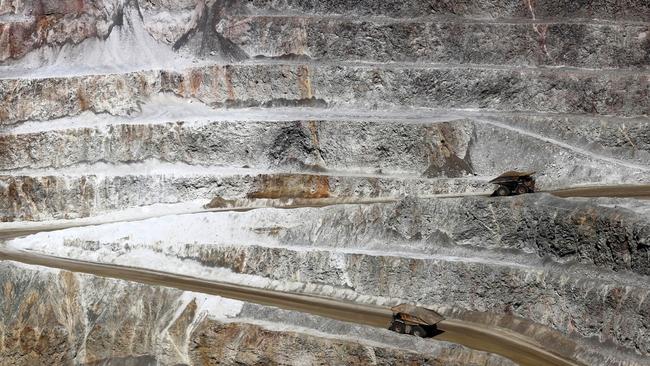
AFP
5.35am: Ryanair bosses’ pay causes turbulence
More than a third of Ryanair shareholders opposed pay deals for senior executives, including handing chief executive Michael O’Leary a bonus despite losses caused by the coronavirus outbreak.
Nearly two-thirds (65.8 per cent) of shareholders approved the settlements at the airline’s annual general meeting, according to a company statement to the London Stock Exchange.
O’Leary, 59, is to receive a bonus of 458,000 euros ($US541,000) for the last financial year to the end of March – close to the maximum of 500,000 euros authorised by the group.
As part of his contract, he agreed a 50 per cent pay cut to 500,000 euros over the year. In total, O’Leary’s remuneration will reach 3.5 million euros this year, including shares.
O’Leary recently decided to reduce his salary by a further 50 per cent to 250,000 euros for the current financial year, given the impact of the health crisis on airlines.
His previous package sparked similar opposition from shareholders in 2019 but the latest comes as the airline industry worldwide is reeling from the coronavirus outbreak.
Ryanair has said it would shed 3,000 jobs or 15 per cent of its workforce, and also told staff to accept pay cuts to avoid redundancies.
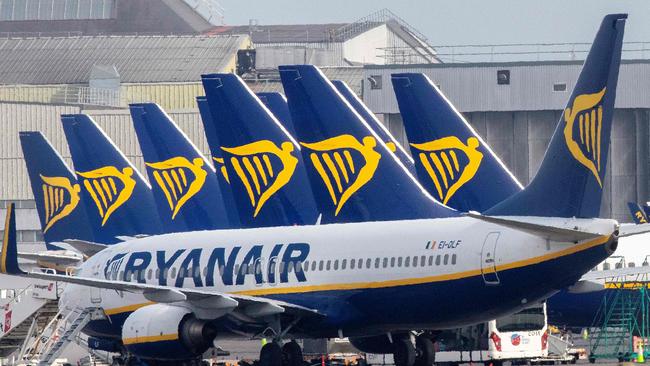
AFP
5.30am: Fed warning sends stocks scurrying
Stock markets slid around the world after the head of the US Federal Reserve warned about the “uncertain” outlook for the virus-hit US economy.
While authorities in numerous countries have been recently upgrading their economic forecasts, central banks are warning that a quick, full recovery is far from assured.
Fed chief Jerome Powell told reporters that although the recovery was looking better than anticipated, “overall activity remains well below its level before the pandemic and the path ahead remains highly uncertain”, and stressed the need for more stimulus.
Meanwhile, if the Bank of England held rates steady it also gave its strongest hint yet that negative interest rates could be on the way, saying: “The outlook for the economy remains unusually uncertain.” For its part the European Central Bank announced it was offering additional temporary relief to banks to help them cope with the impact.
On Wall Street stocks moved sharply lower at the opening bell, though the Dow had recovered most of its losses by late morning. But the S & P 500 and Nasdaq Composite were both solidly in the red.
London finished the day off by 0.5 per cent, while Frankfurt shed 0.4 per cent and Paris fell 0.7 per cent.
Asian equities had mostly dropped following a broadly negative lead from Wall Street on Wednesday.
“A lingering sense of disappointment hangs over global markets in the wake of the Fed meeting,” said IG analyst Chris Beauchamp.
“Investors had evidently hoped for something much more concrete than the relatively vague policy outlook provided by Powell and Co., with equities struggling … and the dollar finding some support.” While the central bank indicated interest rates were unlikely to begin rising for another three years, allowing businesses to borrow at ultra-low levels, Powell’s call for more fiscal help came as US lawmakers seem unable to find common ground on a new support package.
Oil prices jumped as a meeting of the OPEC+ group of crude producing nations got under way.
AFP
5.28am: US housing starts slow
US homebuilding projects started in August slowed after their massive jump in July, with half the country posting double-digit declines while the other half saw big increases, according to government data.
Home sales have showed no signs of slowing despite the coronavirus pandemic, and builders are struggling to keep up with demand, making the housing market one of the major bright spots in the US economy.
Housing starts fell 5.1 per cent compared to July to an annual rate of 1.4 million, far below what analysts had been expecting and driven entirely by the 25.4 per cent drop in construction of apartment buildings, the Commerce Department reported.
New construction of single-family homes increased one per cent to an annual rate of over one million houses, the report said.
AFP
5.27am: P & O Cruises cancels all sailings to early 2021
P & O Cruises has extended its cancellations of sailings until early next year, with the US-owned company pinning the blame on UK government travel restrictions to combat the coronavirus.
P & O Cruises, a British subsidiary of cruise giant Carnival Corporation, halted its operations in March owing to the COVID-19 pandemic.
The holiday operator, which usually visits around 200 destinations worldwide, had been due to restart activities in mid-November. However, on Thursday P & O Cruises announced “an extension to its pause in operations, with all sailings cancelled until early 2021”.
P & O president Paul Ludlow added: “With evolving restrictions on travel from the UK, unfortunately it is necessary to cancel these itineraries.
“These further cancellations vary according to ship as well as complexity and length of itineraries, advice and guidance regarding ports of call and current air availability for fly/cruises.” In a separate sector-wide development, Norwegian cruise company Hurtigruten announced it has suspended all operations until the end of the year.
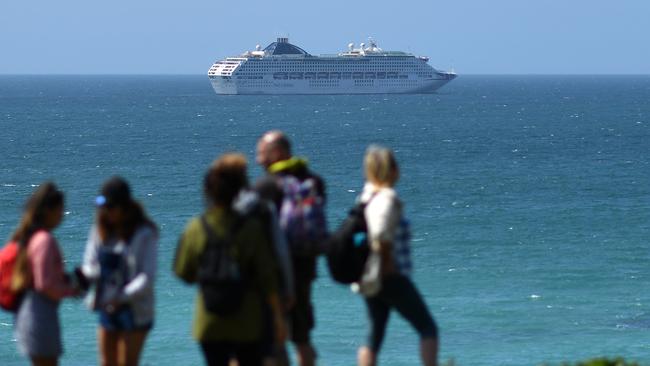
AFP
5.26am: Spain’s CaixaBank, Bankia plot merger
Directors from CaixaBank and Bankia were to meet to approve their merger into Spain’s biggest national lender in a move which will transform the landscape of Spanish banking.
A source close to the deal said the board of directors of both banks will meet to approve the merger, details of which were thrashed out in a series of tough negotiations with Bankia’s biggest shareholder, the Spanish government.
The merger will transform the Spanish banking sector, creating the country’s largest bank with combined assets of around 664 billion euros, Renta 4 Banco analysts say, putting the new entity ahead of Santander or BBVA, both of which have a more international presence.
AFP
5.24am: US weekly jobless claims decline
New claims for US jobless benefits continued inching down last week, the Labor Department said, though at 860,000 the applications were higher than expected.
However the insured unemployment rate among people eligible for benefits fell 0.7 points to 8.6 per cent, and the number of people claiming under a special program for those not normally eligible declined in the week ended September 12 by more than 200,000.
AFP
5.20am: Bank of England eyes negative rates
The Bank of England gave its strongest hint yet that negative interest rates could be on the way as the UK economy battles against coronavirus and Brexit headwinds.
Following a regular policy meeting, the BoE said it had left its key interest rate at a record low of 0.1 per cent amid low inflation and rising unemployment caused by COVID-19 fallout.
The central bank also maintained its cash stimulus, or quantitative easing supporting the economy, at £745 billion ($US947 billion), the minutes of its latest meeting showed.
Markets expect the QE amount to increase, however, before the end of the year. “The outlook for the economy remains unusually uncertain,” the BoE minutes stated, triggering fresh falls in the pound.
Sterling dropped 0.5 per cent against the dollar “after the Bank of England delivered a dovish statement which included overt references to introducing negative rates”, said Neil Wilson, chief market analyst at Markets.com.
The pound has already come under heavy selling pressure this month from the possibility that Britain and the European Union will fail to strike a post-Brexit trade deal.
As well as the pandemic, Britain’s future trading position with the EU is firmly in the BoE’s sights.
AFP


